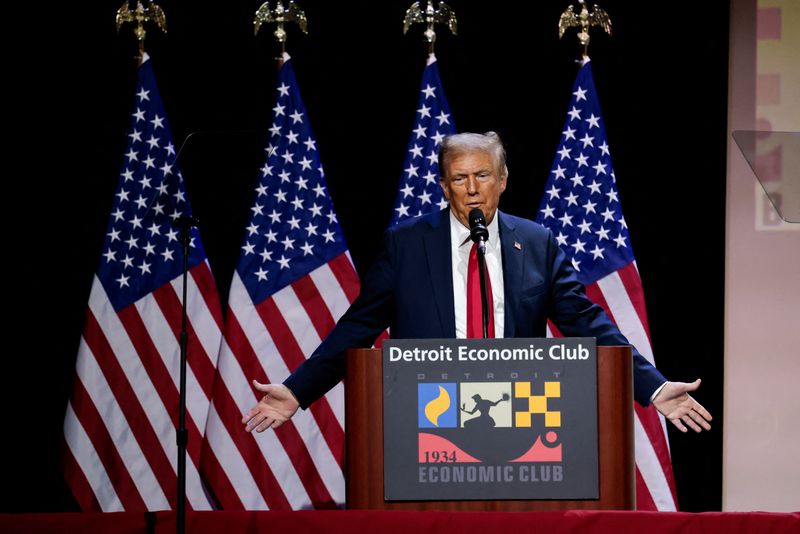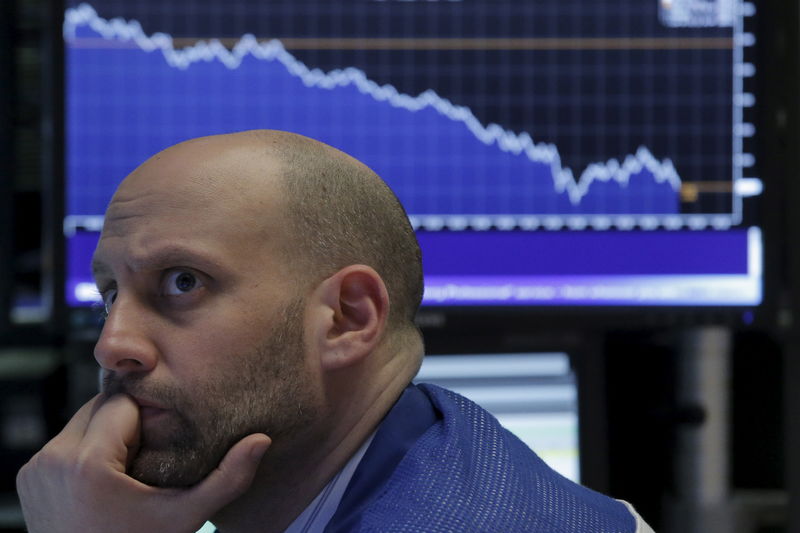By Nora Eckert and David Shepardson
DETROIT/WASHINGTON (Reuters) – Republican presidential candidate Donald Trump on Thursday proposed making auto loan interest tax deductible and preventing Chinese automakers from selling cars in the United States, in an effort to appeal to auto workers in the final weeks of the election campaign.
In a roughly two-hour speech to the Detroit Economic Club, Trump criticized electric vehicles, the United Auto Workers union that represents auto workers, and even the city of Detroit where he spoke.
Polls show Trump and Democratic candidate Kamala Harris locked in a tight race ahead of the Nov. 5 election, with the outcome expected to be decided by narrow margins in battleground states like Michigan, of which Detroit is the largest city.
He alluded to the city’s economic problems in his speech while taking a swipe at Harris.
“The whole country will be like, if you want to know the truth, it’ll be like Detroit. Our entire country will eventually be like Detroit if [Harris] is your president,” Trump said.
The auto lending plan – which would see interest paid on car loans treated in federal tax returns like home mortgages – is the latest in a long line of possible tax cuts floated by the former US president in the final weeks of his campaign against Harris.
The speech focused on the American auto industry, which is headquartered in Detroit. Trump said he would impose new tariffs to prevent Chinese automakers from building cars in Mexico and exporting them to the United States.
Trump, who said Sunday he would impose tariffs of up to 200%, suggested he could impose even higher tariffs on vehicles.
“I will impose whatever tariffs are necessary: 100%, 200%, 1,000%,” Trump said. Mexico exported just over 2.5 million vehicles to the United States last year.
He also said he will formally notify Mexico and Canada of his intention to renegotiate a North American Free Trade Agreement to address concerns about Chinese vehicles. Harris, the US vice president, has also said she plans to invoke the renegotiation clause if elected.
Critics say the free trade deal approved during Trump’s term allowed the Detroit Three automakers to continue producing hundreds of thousands of vehicles in Mexico and exporting them to U.S. buyers.
STIMULATE PRODUCTION
Congress repealed the federal deduction for interest paid on auto and other consumer loans in 1986 as part of a tax reform law. According to auto research firm Edmunds, buyers paid an average of 7.1% interest on new cars and 11.2% on used cars in September.
Trump said the tax cut “will stimulate massive domestic auto production and make car ownership dramatically more affordable for millions and millions of working American families.”
If Trump is elected, he will need congressional support to make changes to the tax laws.
President Joe Biden last month proposed banning key Chinese software and hardware from internet-connected vehicles on U.S. roads over national security concerns, a move that would effectively ban Chinese cars and trucks from the U.S. market. Biden separately announced new 100% tariffs on all Chinese EVs starting September 27 – on top of a 25% import tariff on all Chinese vehicles that Trump imposed.

Trump also said he will close loopholes that allow Chinese cars to enter the US
Biden also proposed last month to ban Chinese automakers from testing autonomous vehicles on American roads.


